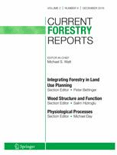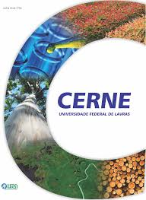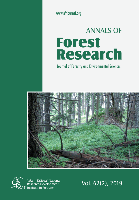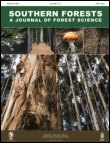
EUROPEAN JOURNAL OF FOREST RESEARCH
Scope & Guideline
Unveiling Insights for Climate-Resilient Forests
Introduction
Aims and Scopes
- Forest Ecology and Biodiversity:
Research on the ecological dynamics within forest ecosystems, including studies on species interactions, biodiversity assessments, and the effects of environmental changes on forest health. - Forest Management Practices:
Investigation into sustainable management practices, including thinning, harvesting techniques, and the impact of these practices on forest structure and ecosystem services. - Climate Change Impact and Adaptation:
Studies addressing the effects of climate change on forest ecosystems, tree species responses, and strategies for adaptation in forest management to mitigate these impacts. - Soil and Nutrient Dynamics:
Research on soil health, nutrient cycling, and the interactions between forest vegetation and soil properties, with a focus on improving forest productivity and ecosystem services. - Technological Advances in Forestry:
Exploration of new technologies in forest research and management, including remote sensing, machine learning, and data analytics to enhance forest monitoring and management practices. - Socio-Economic Aspects of Forestry:
Examination of the socio-economic factors influencing forest management, community forestry initiatives, and the economic benefits derived from forest resources.
Trending and Emerging
- Climate Resilience and Adaptation Strategies:
A growing body of research is dedicated to understanding how forests can adapt to climate change, focusing on resilience-building strategies, species selection, and management practices that enhance ecosystem stability. - Technological Integration in Forest Management:
The use of advanced technologies, such as remote sensing, drones, and machine learning, is increasingly prevalent, driving innovative approaches to forest monitoring, data collection, and management. - Ecosystem Services and Multifunctionality:
There is a heightened interest in studying the multifunctional role of forests in providing ecosystem services, emphasizing the need for holistic management approaches that consider ecological, economic, and social benefits. - Forest Soil Health and Carbon Sequestration:
Research focusing on soil health, carbon dynamics, and the role of forests in climate mitigation through carbon sequestration is expanding, reflecting the importance of soil-forest interactions in climate strategies. - Community Involvement and Stakeholder Engagement:
Emerging studies emphasize the importance of community-based forest management and stakeholder engagement in achieving sustainable forestry outcomes, reflecting a shift towards participatory approaches in forest governance.
Declining or Waning
- Traditional Forest Silviculture:
Research focusing on conventional silvicultural practices has decreased, possibly due to the growing emphasis on adaptive management and ecological approaches that integrate biodiversity and sustainability. - Pure Species Plantations:
Studies focusing solely on the management and productivity of pure species plantations are less prominent, as current trends favor mixed-species approaches that enhance resilience and ecosystem services. - Historical Forest Management Practices:
There is a noticeable decline in papers exploring historical management practices, as contemporary research increasingly prioritizes adaptive strategies and resilience in the face of climate change. - Invasive Species Studies:
Research on invasive species within forest ecosystems appears to be waning, potentially as researchers shift focus towards broader ecological interactions and restoration ecology. - Laboratory-Based Research:
The prevalence of laboratory-based studies has diminished in favor of field-based research that provides more applicable insights into real-world forest management challenges.
Similar Journals

Central European Forestry Journal
Bridging research and practice in forestry for a greener tomorrow.Central European Forestry Journal, published by SCIENDO, is a pivotal platform dedicated to advancing research and knowledge in the field of forestry. Since its inception in 2009, this Open Access journal has provided scholars and practitioners with unrestricted access to cutting-edge research findings, promoting collaboration and innovation within the forestry community. Based in Poland, the journal serves as a crucial resource for researchers, professionals, and students alike, addressing critical topics relevant to the management, conservation, and sustainable utilization of forest resources. The journal holds a commendable Q2 ranking in Forestry, with a notable rank of 51 out of 174 and a 70th percentile in Scopus's Agricultural and Biological Sciences category. With converged publication from 2017 to 2024, the Central European Forestry Journal represents an essential avenue for disseminating knowledge and fostering dialogue in an increasingly important field.

Lesnoy Zhurnal-Forestry Journal
Fostering Collaboration in Forestry Research and PracticeLesnoy Zhurnal-Forestry Journal is a prominent academic publication dedicated to advancing the field of forestry and environmental sciences. Published by the Northern Arctic Federal University M. V. Lomonosov, this journal focuses on innovative research, practices, and policies related to forestry management and conservation. With an Open Access model established since 2015, the journal ensures widespread dissemination of knowledge and foster collaborative research across global scholarly communities. Located in Arkhangelsk, Russia, the Lesnoy Zhurnal appeals to researchers, professionals, and students alike, providing a platform for sharing valuable insights and addressing emerging challenges in forestry. Though specific metrics like HIndex and Scopus rankings are presently unlisted, the journal is committed to excellence and aims to enhance its visibility and impact within the scientific community. This publication is not only a critical resource for ongoing research but a key player in shaping sustainable forestry practices in a rapidly changing environment, making it indispensable for anyone involved in forestry and environmental studies.

Current Forestry Reports
Uncovering contemporary trends in forest science and conservation.Current Forestry Reports, published by Springer International Publishing AG, stands at the forefront of forestry and ecological research, boasting an impressive array of quartile rankings in 2023 such as Q1 in Ecology and Forestry. With an ISSN of 2198-6436, this journal has emerged as a pivotal platform for disseminating innovative research findings and insights critical to the sustainable management of forest ecosystems. Operating out of Switzerland, it covers a broad scope that spans from ecological theory to practical forestry applications and landscape conservation. Notably, it ranks #3 out of 174 in Agricultural and Biological Sciences: Forestry and #4 out of 211 in Environmental Science: Nature and Landscape Conservation, reflecting its high impact and relevance in the field, placing it in the top percentiles in multiple categories. This open-access journal endeavors to provide a comprehensive understanding of contemporary issues, trends, and methodologies in forestry and related disciplines, making it an indispensable resource for researchers, practitioners, and students who are dedicated to advancing knowledge and practices in forest science.

Cerne
Driving Impactful Research in Forestry and BiodiversityCerne is a distinguished open-access journal dedicated to advancing knowledge in the field of forestry, published by the Universidade Federal de Lavras (UFLA). Since its inception in 1994, the journal has actively contributed to the global discourse on sustainable forest management and biodiversity conservation, presenting research findings that are both relevant and impactful. With its ISSN 0104-7760, Cerne aims to foster collaboration among researchers, professionals, and students, enhancing the understanding of forestry practices in Brazil and beyond. As of 2023, it holds a respectable Q3 ranking in the forestry category, further cementing its position within the academic community, illustrated by a Scopus ranking of #97 out of 174 in the Agricultural and Biological Sciences - Forestry field. Operating under an open-access model allows for wide dissemination of research outputs, ensuring that critical findings reach a broad audience, fueling further innovation and discovery in the field. With converged years extending from 2007 to 2024, Cerne continues to be a vital resource for anyone engaged in forestry research and practices.

Revista Forestal Mesoamerica Kuru-RFMK
Fostering collaboration for forest health and biodiversity.Revista Forestal Mesoamerica Kuru-RFMK is a vital academic platform dedicated to the advancement of forest science and management within the Mesoamerican region. Published by the Instituto Tecnológico de Costa Rica, this journal has been an Open Access resource since 2011, ensuring that critical research is accessible to a global audience. With an ISSN of 2215-2504, it aims to foster collaboration and knowledge exchange among researchers, professionals, and students eager to address the pressing challenges facing forests in Central America. The journal prioritizes interdisciplinary studies related to forest ecology, conservation, and sustainable management practices, making it an indispensable reference for anyone interested in enhancing forest health and biodiversity. By contributing to this resource, scholars can impact policy and practice while enriching the academic community’s understanding of Mesoamerica's unique forest ecosystems.

FORESTRY
Cultivating excellence in forestry research and practice.FORESTRY is a prestigious journal dedicated to the advancing knowledge and innovative practices in the field of forestry, published by Oxford University Press. Established in 1927, it encompasses a rich history of scholarly contributions and has evolved to maintain its relevance, addressing contemporary issues and research in forestry and related disciplines. With an impressive Q1 ranking in the category of Forestry, this journal holds a notable position within the Scopus rankings, being placed 20th out of 174 in the Agricultural and Biological Sciences domain, highlighting its significant impact with an 88th percentile standing. Researchers, professionals, and students can access critical insights into forestry management, ecology, and policy, facilitating informed decision-making and fostering sustainable practices. While Open Access options are currently not available, the journal's rigorous peer-review process ensures the publication of high-quality research that contributes both to academic advancement and practical applications in forestry worldwide. The comprehensive coverage from 1927 to 2024 makes FORESTRY an invaluable resource for anyone invested in enhancing the field of forestry.

Forests
Fostering collaboration for a sustainable future in forestry.Forests is a premier open-access journal published by MDPI, dedicated to advancing research in the field of forestry and its related disciplines. Established in 2010, the journal has rapidly gained recognition, achieving a distinguished Q1 ranking in Forestry and holding a commendable position of 38 out of 174 in the Agricultural and Biological Sciences category within Scopus, placing it in the 78th percentile. With a mission to disseminate high-quality research, Forests serves as a vital platform for the exchange of innovative findings, methodologies, and applications related to forest ecosystems, management, conservation, and the socio-economic aspects of forestry practices. As an open-access publication based in Switzerland, it ensures that research is readily accessible to a global audience, fostering collaboration and knowledge sharing among researchers, professionals, and students alike. The journal is committed to contributing to the sustainable management of forest resources and enhancing the understanding of complex forest environments through interdisciplinary approaches.

Annals of Forest Research
Advancing the frontiers of forestry and ecology.Annals of Forest Research is a peer-reviewed journal dedicated to advancing knowledge in the fields of forestry, ecology, and plant sciences. Published by EDITURA SILVICA in Romania, this journal has been an open access publication since 2008, providing a platform for researchers to share their insights and findings with a global audience. The journal operates under a rigorous selection process, reflected in its positioning within the Q2 category in Forestry and Q3 in both Ecology and Plant Science as of 2023. With Scopus rankings indicating a solid percentile among its peers, Annals of Forest Research continues to play a vital role in disseminating innovative research and fostering scholarly dialogue. Researchers, professionals, and students are encouraged to explore its diverse range of articles, which address both foundational and contemporary issues in forest management and environmental sustainability, contributing to the sustainable use and preservation of forest ecosystems.

Southern Forests-A Journal of Forest Science
Shaping the Future of Forestry Through Scholarly InsightSouthern Forests: A Journal of Forest Science, published by Taylor & Francis Ltd, serves as a vital platform for scholarly discourse in the field of forestry. With a robust ISSN of 2070-2620 and E-ISSN of 2070-2639, this journal highlights cutting-edge research and vital advancements from 2008 to 2024. Based in the United Kingdom, it continues to make significant contributions, evidenced by its current Q3 ranking in the forestry category of Scopus as well as its rank of 94 out of 174 in Agricultural and Biological Sciences. This journal caters to a diverse audience of researchers, professionals, and students, providing access to high-quality articles that promote sustainable forest management and ecological studies. Despite being classified as a non-open access journal, it remains a key resource, ensuring accessibility to crucial information that addresses both local and global forest challenges.

Reports of Forestry Research-Zpravy Lesnickeho Vyzkumu
Innovating forestry science for global ecological impact.Reports of Forestry Research-Zpravy Lesnickeho Vyzkumu, published by the FORESTRY & GAME MANAGEMENT RESEARCH INST in the Czech Republic, serves as a vital forum for the exploration and dissemination of cutting-edge forestry research. With an ISSN of 0322-9688 and an E-ISSN of 1805-9872, this journal provides insights into various dimensions of forestry, nature conservation, and environmental sciences, contributing to both regional and global ecological discourses. Although currently categorized in the Q4 quartiles for Forestry and Nature and Landscape Conservation as of 2023, the journal aims to foster collaboration among researchers, professionals, and students devoted to sustainable forest management practices. The Scopus rankings reveal its position within the environmental science community, highlighting its role in addressing pressing ecological challenges. As the field continues to evolve, Reports of Forestry Research anticipates growth in accessibility and relevance, an essential resource for those committed to advancing forestry science and conservation efforts.